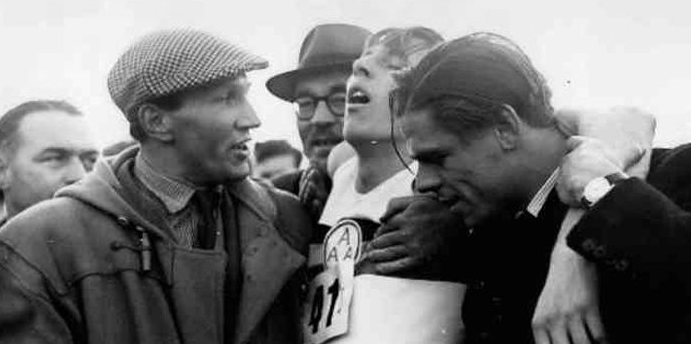“Training is principally an act of faith.” That is from Franz Stampfl who, I suspect, you have never heard of although he was Roger Bannister’s coach. Though Stampfl had a very interesting life, this is not a post about him, but rather about this thought of his on training (however, I’d highly recommend reading this brief Wikipedia story about his very interesting life here).

The man in the cockney hat on the left is coach Franz Stampfl helping to support Roger Bannister after his sub-4-minute mile on May 6, 1954.
While equating training with believing seems like a strange assessment, I’d suggest it’s right on. Just as with faith, training success is largely based on belief. The problem with training is that you won’t know if you did the right workouts for several weeks after the most recent sessions. The daily fitness gains are so tiny that if you tried somehow to measure them in a lab, the daily changes, if any, would certainly fall within the calibration range of the equipment used in measuring. So training is, most definitely, an act of faith. You really don’t know, for sure, if progress is being made. Right now you only believe it is. At the present moment it’s entirely an unknown. It will probably be somewhere around 6 weeks beyond your recent workouts until you know for sure if it worked or not. And that still doesn’t necessarily mean that you got it exactly right a few weeks ago. Perhaps you could have done something else that would have produced even better results. You’ll never know for sure. That’s why it is entirely an act of faith. You’ve got to believe. If you don’t then you’re probably just messing around by doing stuff without purpose or intent while keeping your fingers crossed. But, interestingly, if you do have total faith in your training then you may still see positive gains at some level even if you did the “wrong” stuff. It could be that the placebo effect works here just as well as it sometimes does with “sugar pills” or similar non-medicinal treatments used in health research that somehow produce positive results comparable with that of standard medical care (see example here). Simply believing often works.
Coaches know this all too well. If I have an athlete who believes in the training program I’ve laid out for them then we’re at least half way there already. But if they don’t believe in it, no matter how much data I show them of its efficacy, then we’re both wasting our time. The athlete would be better off working with another coach who they believe in.
I recently had such an experience with an athlete who purchased one of my training plans. Within a couple of days of the purchase he wrote to complain that it only had two “structured” workouts per week. By that I took it he meant interval- or high-intensity type workouts as all of my workouts are structured, but not all are high-intensity interval sessions. I suspect he’s the type of athlete who believes that if he isn’t going “hard” then he’s wasting his time. There are a lot of athletes who believe in that method—no pain, no gain. I could have presented quite an argument for him on why what I put into the training plan should work for him. But it would have been a waste of his time and mine. I simply refunded his purchase price in full and we went our separate ways. There was no reason for me to try to change his training faith as his appeared to be well-established. Perhaps the placebo effect works for him when he races.
Training is most definitely an act of faith. Working with a coach is just the same. If you don’t believe the program the coach has put together for you is going to work then you’re probably better off finding a different coach. Coaches are also aware of this and so should work to convince you upfront that their plan for you is based on solid evidence and reasoned consideration. They know that your belief is fundamental to your success—and theirs.

You must be logged in to post a comment.